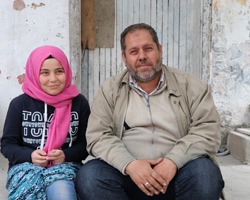Supporting Syrian refugees in Turkey with the health services and guidance they need

With Syria’s health-care system shattered by years of conflict, patients with chronic diseases have seen their much-needed treatments interrupted. In Aleppo, Mohammed watched in desperation as his daughter Vale failed to receive the blood transfusion needed to treat thalassemia, an inherited blood disorder commonly found across Syria and other parts of the Middle East. “Before the war, Vale received her treatment from a local hospital,” he explains. “When the war began, she could not access the service anymore. For some months she didn’t get any blood transfusion; I was very scared.”
When the family arrived in Turkey, they settled first in the southern city of Hatay. But Mohammed still had no idea how to get the necessary treatment for Vale. “We could not speak Turkish, so we didn’t know the medicines were free of charge in Turkey. I borrowed money from neighbours to have the medicines sent from Syria,” he explains. “When I could not manage to get enough, Vale had to cut down on the medicine – we would stretch the use of a 1-month package for 2 months, and so on.”
Syrian health workers help their fellow nationals access care
After some time in Hatay, Mohammed and his family moved to Ankara. “The neighbours soon told us about a nearby health centre where they could help Vale,” Mohammed recalls. When the family visited the WHO-supported Refugee Health Training Centre (RHTC), they were soon referred to a paediatrician.
Dr Ahlam, who worked in a research centre specializing in haemolytic blood disorders prior to the conflict, was able to take quick action. She referred Vale to a hospital where she is now able to receive monthly blood transfusions and care from specialized health-care staff. “I receive constant information on her status from colleagues at the hospital and I monitor her closely at the centre,” says Dr Ahlam.
Dr Ahlam, who has been working in the centre for 2 years now, is one of the 1200 Syrian doctors trained by WHO to serve in the Turkish health system, providing culturally sensitive health-care services for their fellow nationals in their native language. In support of Turkey’s Ministry of Health, WHO trains these health-care workers to reduce the language and cultural barriers that refugees experience when trying to access health-care services. This intervention helps to boost the resilience of the Syrian community in Turkey while strengthening a refugee-sensitive health system.
Social workers offer continuous guidance and support
Upon registration at the centre, Mohammed and his family were also referred to a social worker to assess their situation. Zeynep welcomed them in Arabic and provided them with general guidance. “In the beginning she was visiting us almost every day. She helped us to register in the country, to get additional aid, she came with us to the hospitals and explained everything to us in our language,” Mohammed explains.
WHO employs social workers at the 7 refugee health training centres to provide additional support to Syrian families and health-care teams. They identify risks and address the different needs by referring refugees to relevant social, legal and protection services, as part of a comprehensive response. Social workers like Zeynep play a key role in building bridges between the health centre and the community. “I’m so comfortable with Zeynep, she helped my daughter and my family so much. When there is a problem, I go to her,” says Mohammed.
The Refugee Health Programme is currently supported by the generous contributions of Germany, through KfW Development Bank; the European Union Regional Trust Fund in Response to the Syrian Crisis; the Bureau of Population, Refugees, and Migration of the United States Department of State; and the Government of Japan.




